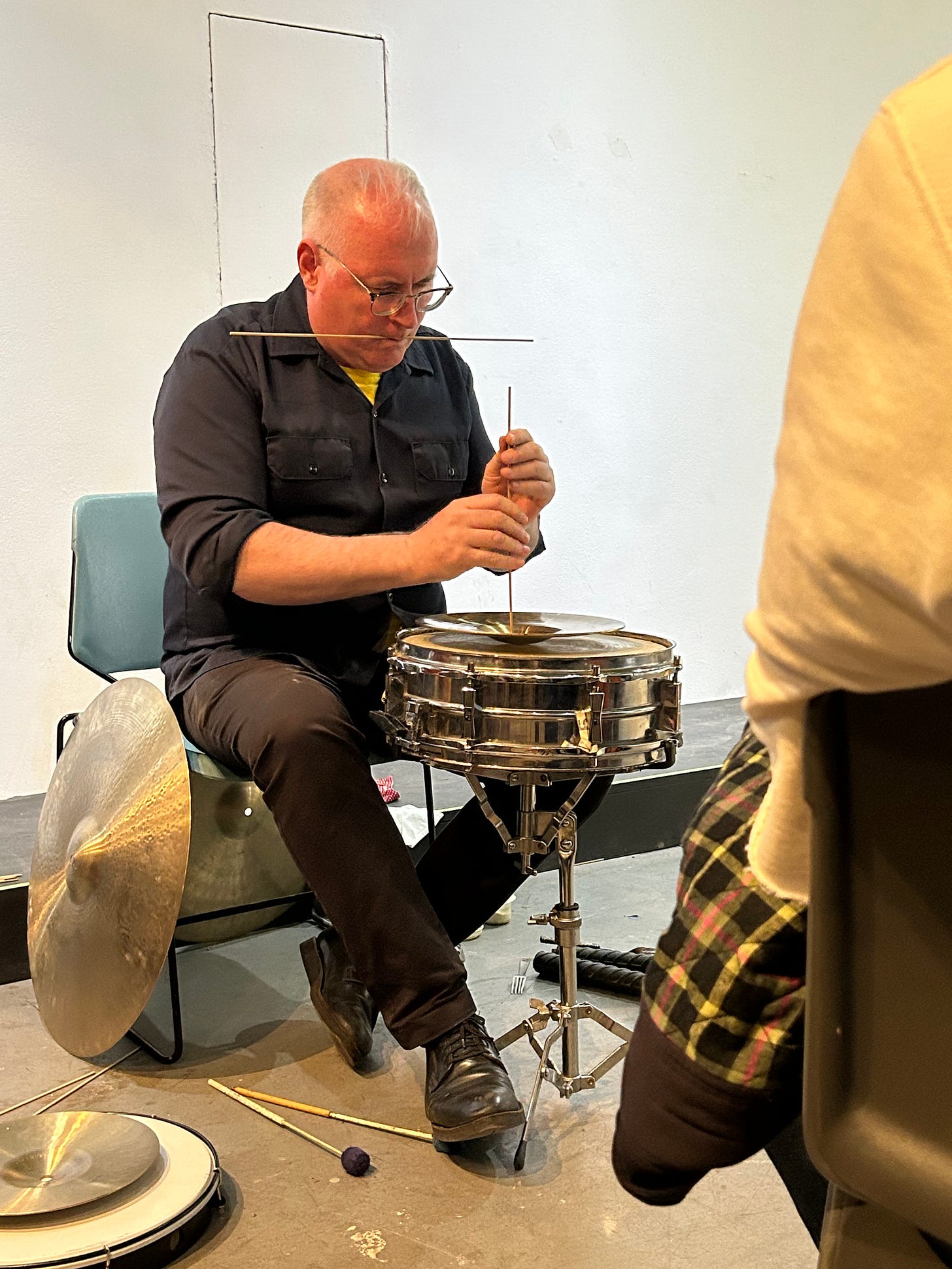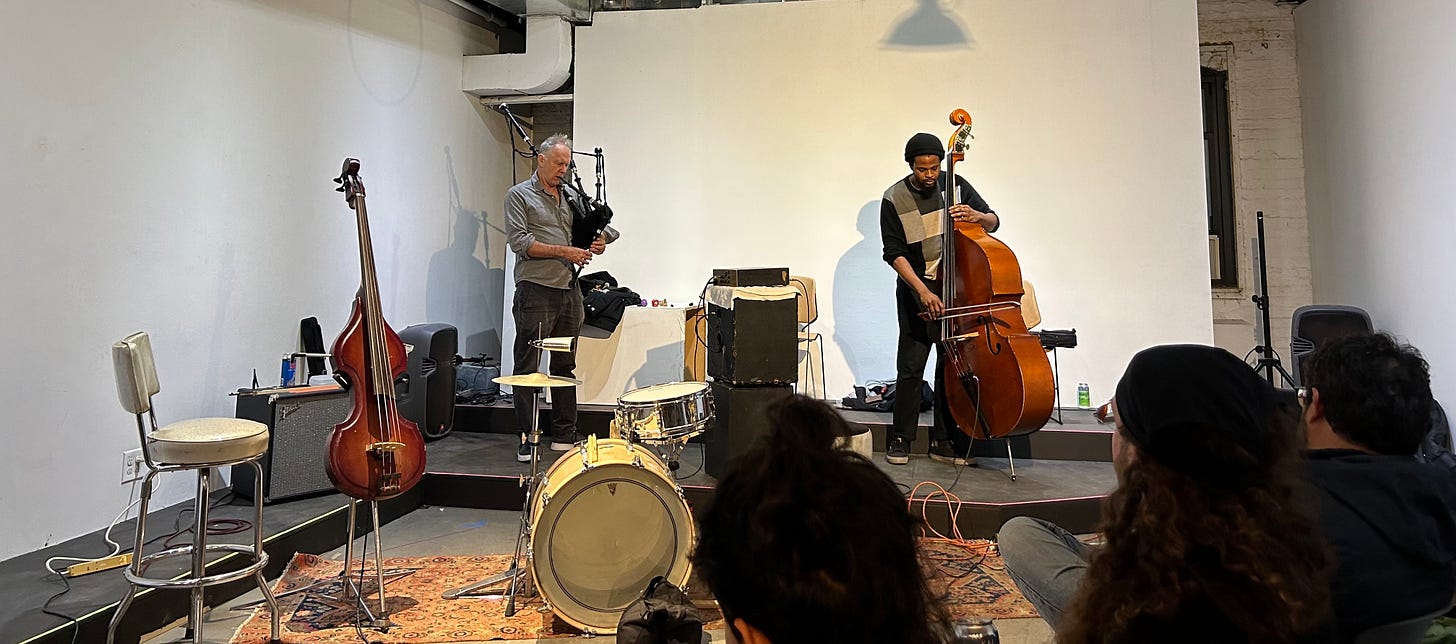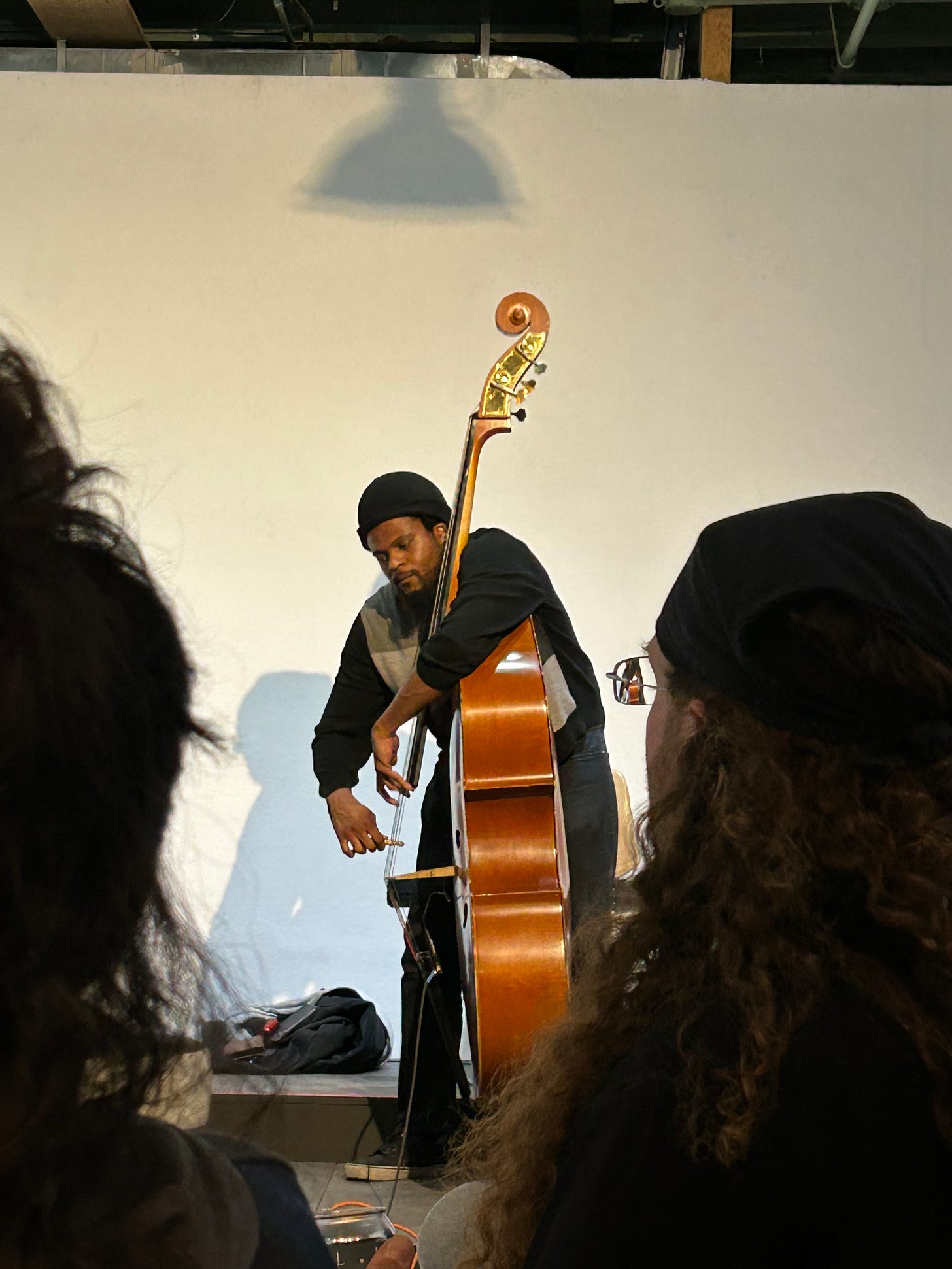"Cannot Choose But Hear": David Watson & Co. in Long Island City
The first concert in the new Striped Light series featured a painful but mesmerizing bagpipe-bass duo, diaphanous solo percussion by Sean Meehan, and a rare performance by In Defense of Memory.
Last night at a secret location in Long Island City, Knitting Factory alumnus and experimental music lodestar David Watson brought together bassist Luke Stewart, percussionist Sean Meehan, and In Defense of Memory — a trio from Santa Fe comprised of Laura Ortman (amplified violin), Carlos Santistevan (amplified violin), and Marshall Trammell (percussion) — for a rare, hypnotic and antagonistic collaboration.
The first concert in the inaugural Striped Light series, the concert was the latest iteration in Watson’s practice of finding spaces — like FourOneOne in Williamsburg — to present improvisational, experimental music in intimate settings. The only trouble, a friend of Watson told me, is that the buildings Watson performs in keep getting knocked down. In LIC, amidst huge glass high-rise buildings that are as nauseating as the ones in the Seaport District of Boston, I’m worried that could happen here. But, for now, this you-know-if-you’re-in-the-know series is a continuation of the underground loft scene that dominated the Williamsburg avant-garde in the earlier part of this century. As such, it’s one we should all be thankful for.
Striped Light is supposed to continue in the same space. You can keep yourself updated by following on Instagram. DM them for exact location details.
In Defense of Memory doesn’t usually get up to these parts, a friend of Santistevan told me. They’ve all got day jobs and they aren’t touring that much. To see them outside of their native New Mexico is a treat.
They describe themselves as “a performance-constellation in a confluence of principled, cultural activities set in an ecology of Indigenist trajectories of solidarity, historic resistance technologies and resonant sonic vibrations set in Albuquerque and Santa Fe.” What a glorious mouth-full! What this means in practice, it seems to me, is that their music is, in a post-colonial way, totally antagonistic to the common practice and methods of through-composed Western music. They just destroy all of it.
I regret that I couldn’t stay for the whole thing, but I thought I should document what I did hear and see.
During the soundcheck, Watson tried out his bagpipes, which were earsplitting loud in the little basement loft. Then, he and Stewart got started, and created an assaultive, loud, unison, droning noise. I felt like I couldn’t escape it; it entrapped me. One guy in front of me rocked to its hidden rhythms, layered with overtones, while others closed their eyes. We were living in the sound. Stewart rubbed the body of his amplified double bass while pushing and pulling it closer and further from the amplifier, playing with feedback. He put his fingers between the strings, close to the bridge, and bowed viciously, and later plucked the instrument with a firm hooked finger.
I realized, looking at Watson, that if you listen to bagpipes for long enough, they can cleanse you. My brain felt like it was being purged of impurities, especially when he launched into frantic, repetitive, phasing, Reich-like figures. I couldn’t choose but to give my complete attention to the music that surrounded me. I felt like Coleridge’s Wedding-Guest, who, listening to the Ancient Mariner, “cannot choose but hear.” It was excruciating. My attention wandered. But it eventually felt like home, like if the music stopped, I’d die.
Next, Sean Meehan sat at his lone snare drum, which he tinkered with using a host of objects. He scratched it with forks. He supplemented it with spiraled claves, which he let fall to the ground with a resonant thud and rubbed together. He placed a cymbal upside-down on the snare, inserted a dowel in the hole of the cymbal, and ran his fingers down it in continuous motion, one hand after the other, creating a wave-like resonance. He turned the snare on, causing the frequency to rattle the beads underneath. It was a new instrument. It was like looking at a craftsman working in his workshop.
At a time when alienation from the means of production is at an all-time high, it was almost like looking back in time, to an era when we made and used the products that we crafted. Meehan was making and using the instrument he had invented. It was like looking at the first human to make fire.
There is also alienation in making music from Mozart, Beethoven, Chopin, etc. It is an alienation from the means of music production. An alienation from the instrument. Because the main relationship in “classic” music is, for the musician, between him and the Platonic idea of the musical composition. The perfect form. Its shape is somewhere out there, an ideal which an earthly interpretation can only approximate. This is of, course, because the sheet music signifies this ideal. It says, “there is a perfect performance of me, and you can read it in the ink right here.” Without the sheet music, there would be no ideal. In music like this, the place of the actual instrument is secondary. The musician doesn’t think twice about what their instrument is physically capable of. I’m a pianist and I don’t know shit about my instrument. That’s why we hire piano tuners.

But with Meehan’s music, the musician is no longer alienated from his instrument. He is actually creating his instrument as he goes. In fact, the main relationship, the most immediate one, is between musician and instrument, not musician and sound. The audience are the ones who engage in a relationship with the sound, and, as a result, it is they who are alienated from the instrument because it is new. They’ve never experienced it before, and it is being created in front of their very eyes without their intervention. When you listen to a Mozart piano concerto, you aren’t alienated from the instrument because, presumably, you have a pretty good idea of what a piano is — 88 keys, pedals, hammers hitting the strings. But I don’t know what Meehan’s instrument is. I’m alienated from it. Meehan’s music, then, offers a rebuke to capitalist alienation, which finds its way into score-based, sheet music-based music.
Anyway, I left halfway through Meehan’s performance, going “like one who hath been stunned” (Coleridge, again). Telling from Striped Light’s Instagram posts, In Defense of Memory played an equally excruciating and encompassing set. A promising seed for concerts to come.
Listening to experimental music can indeed feel like listening to the rhyme of the Ancient Mariner, his glittering eye and hoary beard shrouding his past in mystery. But still, I encourage you to be like the Wedding-Guest: Rise the morrow morn, and let your ears bleed. Sounds like those from last night shock us out of complacency like the Ancient Mariner’s STORM-BLAST. There are too many soothing sounds in the world.



